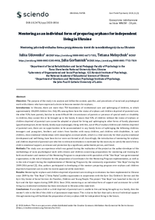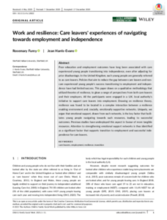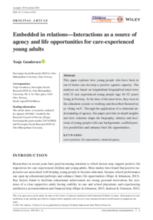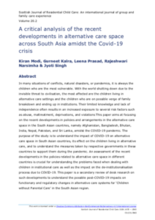Displaying 201 - 210 of 991
The purpose of the study is to analyze and define the content, specifics, and procedures of social and psychological work with citizens who have expressed a desire to become mentors for orphans.
This paper draws on a qualitative methodology that utilized theories of resilience, to glean a range of perspectives from both care leavers and their employers.
This paper explores how young people who have been in out‐of‐home care develop a positive agentic capacity.
This article presents the case for an independent care leaving policy in Ethiopia to address the multifaceted needs of children in care and improve the care leaving service in the country.
This article combines insights from Beck’s individualization theory and Crenshaw’s intersectionality theory to enhance understandings of why youth transitioning out of the child welfare system experience risk of poor outcomes.
This article presents descriptive information on the 25 families that enrolled and received Success Coach services and 38 families in a control group using data from baseline and follow-up surveys and administrative data to examine safety, placement stability, and well-being.
This study aims to explore the experiences of Ghanaian care leavers to discern the factors that promote and impede their educational attainment.
The article analyzes the results of a sociological study of the prospects for improving the system of social protection of graduates of institutional institutions in Uzbekistan.
This case study highlights some of the prerequisites for the starting point of a successful transition from residential care to a non-residential model, many of which are often overlooked or underestimated. The case study is organized around the various stages of transition and explores some of the key themes outlined in the Transitioning Models of Care Assessment Tool.
The purpose of the study is to understand the impact of COVID-19 on alternative care space in South Asian countries, its effect on the children living in alternative care, and to understand the measures taken by respective governments in these countries to support them during the pandemic.





